- Home
- Iain Pears
The Raphael Affair Page 8
The Raphael Affair Read online
Page 8
Apart from that, Bottando genuinely liked the man’s sense of humour, and Paris had become one of the few places outside Italy that he travelled to willingly. Janet’s only real disadvantage, apart from powerful halitosis, was that he refused to speak anything but French, and this limited conversation. Especially as Bottando was an equally idle linguist – although he could become positively fluent after a good meal and a cognac.
He stumbled through his greeting, again acutely conscious of what he was sure were the contemptuous eyes of the bilingual Swiss policemen, and made up for it by wringing his friend’s hand firmly and beaming at him.
‘I am delighted to see you once more, my friend,’ said Janet. ‘What do you think of our little bit of detective work, eh? And even,’ he added, waving his hand at the still silent Swiss, ‘persuading these secretive folk to let us look in one of the vaults! Not bad for an old Frenchman.’
As they were led down the stairs and through a series of gleaming steel gates towards the deposit boxes, Bottando congratulated his colleague on his swiftness and fortune. ‘Fortune, poof! Good police work. Research, interviews, careful questioning. Well, perhaps some luck. But only a little.’
Bottando confessed that he didn’t think there would be much in the box to interest him. ‘After all, our icons disappeared nine years ago. The chances of him having kept one as a souvenir are a bit slight – even if he did take them.’
‘I, also, do not expect a treasure trove. But who knows? It is a pity he died so inconsiderately. A brief conversation would have been very interesting.’
Playing the Gallic extrovert with gusto, a role he habitually adopted when dealing with any sort of foreigner, Janet rubbed his hands together with theatrical anticipation as the heavily armed security guard took out a key and inserted it in the door of a large steel box, one of about a hundred in the room they had entered. Bottando noted that most of the owners were probably under the impression that theirs was the only key to their box, and that whatever they chose to keep in it was absolutely safe from either theft or, sometimes worse, examination. Another example of Swiss duplicity, he thought.
Morneau’s box was about two feet square and three feet long, with a door of angled sheet steel two inches thick. As one of the Swiss policemen had told them on the way down, it was one of the most expensive types he could have rented, and cost ten thousand Swiss francs a year. That in itself, he added, suggested that there should be something interesting inside.
He was wrong. There were no stolen icons, no convenient address books containing the names of icon collectors, no sets of accounts detailing payments received, nothing at all that would get the investigation any further along. But there was a lot of money: some half million Swiss francs, at least fifty thousand dollars in small denomination notes, and the same amount again in Deutschmarks and sterling. All in all, about four hundred thousand dollars in loose currency. Apart from that, the only contents were a bundle of sketchbooks, well-thumbed and spattered with blobs of paint, bound up with a length of red tape. While the money was being taken out and counted, and sets of serial numbers taken down so that attempts could be made to trace their origin, Flavia sat down in a quiet corner – she had been largely ignored all morning and had barely spoken a word since they landed – and flicked through the sketchbooks.
Some of them were clearly many years old, and were full of details of arms and legs, different types of faces and costume, the sort of thing that every art student at one of the more traditional painting academies is required to turn out. She remembered that, in the thirties, Morneau had been at the prestigious Académie des Beaux Arts in Paris and had made the beginnings of a promising career as a painter before turning to the more financially rewarding business of dealing. He had also taught in Lyons before going commercial. As she looked at the sketches with a critical eye, she could see why. He was very skilled, and the line drawings particularly were executed with ease and dexterity. But they were old-fashioned in the extreme, and almost entirely derivative. Dredging up the remnants of her education, she spotted drawings after Rembrandt, legs copied from Parmigianino, endless repetitions of fragments from the Sistine Chapel, all done with minute changes as the artist experimented to see what the painters had been doing.
Intermingled with the sketches were voluminous jottings. The notes were probably part of the dreary lectures in art history that were churned out until the riots of 1968 produced a revolution in methods. The new way didn’t produce any better painters, but it was probably less boring. Recipes for paints, quotations from artists, extracts from books on techniques, all written in a fast, ill-formed hand that was often barely legible. The other books, many in better condition than the first, were of the same type. The newest were the three at the top of the pile and, once more, followed the same pattern.
Flavia decided that recognition of painterly style was merely a matter of keeping the eye practised. In the first volume she examined she had had to concentrate hard to tell even Rubens from Correggio. Now, after only a few minutes, the recognition was coming much faster and more easily.
She looked again, concentrating hard, and then glanced up to confirm that the five men were still busy talking to each other and were ignoring her very existence. She slipped three of the books in the black leather handbag that everyone in her office always made fun of for being so absurdly large and unladylike, bound the rest in the red cotton tape, and replaced them on the table with the bundles of money.
Forty-five minutes later, the two Italians and the Frenchman were sitting in a restaurant ordering food. Lunch had been Flavia’s idea, and it had been taken up enthusiastically by her superiors, if for different reasons. There had been a polite disagreement about where to go. Janet had suggested an Italian trattoria, Bottando had returned the compliment by insisting that they go French. Because he was very much of the opinion that this was by far the best decision, Janet had let himself be persuaded, but made up for his chauvinism by ordering a bottle of Montepulciano, which he considered one of the few Italian wines that might deservedly have been produced in his home country.
He took an appreciative sip then asked, ‘Well, my friends, and what is it that I can do for you?’
Bottando looked surprised. ‘For us? What makes you think we want something?’
‘I do apologise, but I’m sure one of you does. I am a thoughtful person, and observant. And I know you well. You are a polite man, and you were very rude in disposing of those Swiss so that you could eat alone in my company. I am flattered, and I know your opinion of our Swiss colleagues. But you could have asked me earlier and made it less obvious. So, I think to myself, you want to ask me something that has only just occurred to you. And the invitation came after that whispering in your ear from your assistant here. Therefore…’
‘Entirely incorrect. I just wanted to enjoy my lunch rather than have to suffer through it. Although I must admit I do want to hear what you know about Morneau. He sounds a character.’
‘He was. I recommend, by the way, the trout. It comes with one of the few sauces they do here which doesn’t have too much flour. Otherwise, stick to the veal. It is very good to see you again. But, I must insist that you play fair. I will tell you about the life and secret career of Monsieur Morneau – as much as we know – if you tell me the latest goings-on and scandal in Rome. I haven’t seen you for some time. There must be a great deal I’ve missed.’
He fussed over the bread, spearing it on his fork and using it to sop up some garlic sauce from his plate, while Bottando considered whether he should break the policy of silence about the Raphael which he had so convincingly explained to Flavia several weeks back. It was about the only decent anecdote of recent vintage, and he knew Janet would appreciate it. On the other hand, he doubted the man’s ability to keep it to himself.
‘Well, then,’ Janet began, lifting his head reluctantly from his plate and wiping a dribble of gravy from his chin. ‘As you probably noticed, Morneau was an exceedingly rich man fo
r an art dealer. He had an extravagant lifestyle, a house in Provence, a spacious apartment in Paris, and a gallery which, although successful, certainly did not generate enough income to support his expenditure. No mortgages, no debts. All his residences, incidentally, had been completely swept of any incriminating papers by the time we got there to have a look around. A very tidy man.
‘So where did this money come from? Not from legitimate activities, and not from peddling stolen icons either. We know of twenty-five he probably stole. Even if there are another twenty-five we don’t know about, that gives you, say, six or seven million francs over a ten-year period. He spent much more than that. So what else was he up to?
‘Then he disappears. This is a man who turns up at almost every gallery opening, hasn’t missed a performance of the ballet for nearly fifteen years, and is an artistic socialite of the first order. He ducks out of sight for nearly a year, and then he turns up, in an embarrassing position and dead. So where has he been, eh? Tell me that.’
He finished his little speech and smiled, as if expecting applause for the brilliance of his logic.
‘I was hoping you would. You haven’t actually told us anything at all. What was he doing?’ Bottando asked.
Janet shrugged. ‘There I cannot help you. Deduction can take you only so far. Any further requires more information. Now tell me. What about Rome?’
Before he could begin, Flavia, who had been staring absently out of the window, made one of her first comments of the day. She didn’t like being ignored, although she was occasionally prepared to put up with being treated as merely a decorative appendage by Bottando. He didn’t do it very often and, besides, he was old and southern and could hardly be expected to be perfect. But it was time, she decided, to make her presence felt.
‘Maybe we should test the Commissioner’s powers of deduction a little further,’ she said, smiling winsomely at the Frenchman. She always did that when she suspected she might be being a little rude. But before she could proceed further along these lines, Bottando interrupted her.
‘Quite,’ he said. ‘But how good a painter was he? What were those fake icons he turned out like? It struck me that we might approach some of the more reputable forgers in Naples and ask a few careful questions there. Now he’s dead they would probably be more forthcoming than usual.’
Janet considered the matter for a moment. ‘As for Morneau’s qualities as a painter, he was very good indeed, but he was born too late. He disliked modernism in all its forms. Had he been born a century earlier he would have had a great success.
‘His icons were very variable. The earliest ones were good, painted on old panels, covered in dirt, quite well-executed. But once the technicians knew what they were looking for, they could easily spot them – something about paint in wormholes, which you don’t get in the real thing. The later ones were sloppy. It looks as though he realised that they didn’t really have to be that good to be convincing, so stopped wasting so much effort.
‘Technical problems aside, however, they are remarkable, even the bad ones. They have a great spiritual quality, almost as if he were painting for his own sake. I’m not really surprised the monks were taken in. Once they had been aged and covered with dirt, they looked wonderful, even better than the originals. You should see them. One always tends to assume that fakes are not as good as the real thing. I’m not so sure. Morneau understood the paintings. That’s where most of these people fall down.’ He smiled at the two of them. ‘There. All along you suspected your old friend was a philistine, eh?’
They had reached the coffee, and the conversation showed signs of wandering off into the byways and alleyways of anecdote. Flavia stirred herself for another attempt.
‘Commissioner,’ she began. ‘The bank’s log of when Morneau opened his box. When was the last visit?’
‘I don’t know. We haven’t been able to get that out of the bank yet. However, according to his passport, he last visited Switzerland in May,’ he answered.
She smiled in quiet triumph. She must remember to point out to Bottando what an extraordinarily good employee she was. Even if she occasionally caused him a great deal of trouble and heartache. As she was about to do now. She reached into her handbag and took out one of the sketchbooks she’d purloined. Apologising insincerely for abducting evidence in such a cavalier fashion, she handed it across to the two men. ‘Have a look at that. Ring any bells?’ she asked.
Janet glanced at it, looked noncommittally puzzled, and passed it to Bottando. He was equally blank. Then Flavia detected vague stirrings of unease, and a sudden realisation. ‘Ah,’ he said as he handed it back. Very quick on the uptake, really, she thought.
‘I don’t mean to be inquisitive…?’ Janet said.
Bottando looked flustered. ‘Indeed not,’ he said. ‘But this must be kept very quiet. The slightest hint could wreak havoc on the market.’
Flavia was again impressed. She’d had the entire walk to the restaurant to work out the implications of the discovery; Bottando had had only a few seconds and he instantly saw the problems and pitfalls. Especially the impact on the art market if the slightest breath slipped out.
‘Of course, of course,’ replied Janet. ‘But what is it, exactly, that I’m not meant to hint about?’
Flavia handed him back the notebook. ‘These sketches,’ she said casually, ‘would appear to bear a remarkably strong resemblance to the portrait of Elisabetta di Laguna in Rome. By Raphael. Or perhaps we’d better begin to say, attributed to Raphael.’
Janet looked again, then nodded. ‘I suppose they do. But so what? Every artist in the western world has probably made sketches of it.’
‘Before last May? Before the painting had been uncovered and before anyone could possibly have known what it looked like?’
Janet leaned back in his seat, and a broad smile slowly spread across his face. ‘How splendid,’ he commented eventually. ‘How delightful,’ he said after further thought. ‘How very awkward for you,’ he added apologetically as an afterthought.
‘When you’ve stopped enjoying yourself,’ Bottando said severely, ‘you’ll begin to see why it’s important you keep very quiet. No gossip back in the office. Not a word. Not even to your wife. Or anybody.’
‘Oh, quite. Quite. But please, I beg you. Clear this one up quickly. Every day without telling someone will be a day wasted. And, of course,’ he added, with some attempt to return to professionalism, ‘any help you need of me, just let me know.
‘Oh dear,’ he said, his face cracking with pleasure once more, ‘I wish I could be there when you tell that awful man Tommaso.’
‘Everybody says that,’ said Bottando gloomily. ‘But I’m the one who is going to have to face him. I may not survive the blast.’
The meal ended shortly after that, Janet heading back for France in good humour and with a promise to send on the log when he’d got it out of the Swiss. Bottando’s spirits were considerably lower. Before they boarded the plane that was to fly them home from Zurich to Rome at four o’clock that afternoon, he phoned the museum and asked to speak to the director. He was in a meeting, and a secretary, clearly briefed to deflect all unforeseen calls, declined to bring him to the phone, even though Bottando insisted that it was an important matter and police business.
Bottando gave up the struggle. He’d have to go to the party after all, and catch him there. The worst of both worlds, he thought morosely.
8
Once he arrived at the museum in the Borghese gardens, Bottando handed in his coat and made his way along to the ground-floor gallery where the reception was taking place. It was a big affair, well under way by the time he got there, and the main sculpture gallery had been thrown open to accommodate the dozens of guests. He took a glass of champagne from a passing waiter, noting that, as usual, Tommaso was deploying what he always claimed were scarce museum funds in a lavish fashion.
‘Not at all,’ replied a museum member who had zeroed in on the same tray of drinks and to w
hom Bottando made this somewhat cynical comment. ‘Tommaso calls it investment. He has a point, in fact. This bash is in honour of those gentlemen over there.’ He pointed towards a group of half a dozen men leaning on a large statue.
‘Doesn’t anyone mind them using a Canova as a drinks trolley?’ enquired Bottando. He looked at the group closely. They had all just come in to the room with the director, and were standing around one of the giant statues in the middle of the gallery. All wore light-grey suits, blue shirts and striped ties. They were talking intensely, and Bottando suspected they were not discussing the artistic beauties which lay all around them.
‘Certainly not. You see, they’re American businessmen who are hoping to win a government defence contract.’ The man made an expansive gesture which was meant to give an impression of gigantic wealth and the machinations that go along with it. It was a broad sweep of the arm, not very well co-ordinated. Bottando decided he’d been drinking.
‘And what better way of creating the right impression than making a large donation to the national museum,’ Bottando finished for him. The young man, in his thirties with an open countenance that was currently shaded by alcoholic distress, nodded firmly.
‘Exactly. Their big white chief is currently locked in discussion with Tommaso in his office. To be followed, no doubt, by a large cheque which will cover the cost of the party and leave a considerable amount over to deal with the abominable electrical circuits in this run-down old dump. Clever, eh?’
Bottando turned towards him. ‘Do you know,’ he said, ‘I think that you’re the first person in this place who’s ever said a positive word about Tommaso.’
The man’s face clouded. ‘Giulio Manzoni, by the way,’ he offered, holding out a hand which Bottando briefly shook. ‘Deputy restorer. I admit he’s not liked. But he’s really not as bad as he seems. And this place needed an awful good shake to knock some of the dust out. Not that my relatively favourable opinion will do me much good, alas.’

 The Dream of Scipio
The Dream of Scipio Stone's Fall
Stone's Fall The Last Judgement
The Last Judgement An Instance of the Fingerpost
An Instance of the Fingerpost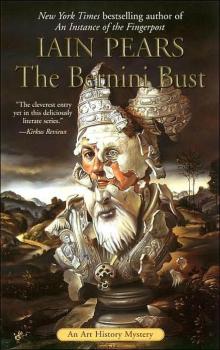 The Bernini Bust
The Bernini Bust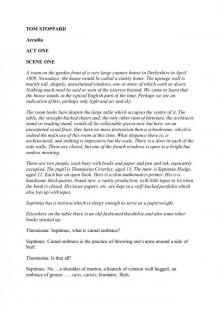 Arcadia
Arcadia Death and Restoration
Death and Restoration The Raphael Affair
The Raphael Affair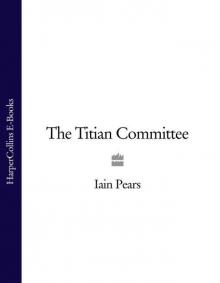 The Titian Committee
The Titian Committee The Immaculate Deception
The Immaculate Deception Giotto's hand
Giotto's hand The Portrait
The Portrait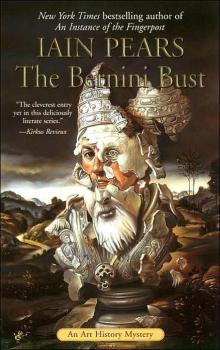 The Bernini Bust ja-3
The Bernini Bust ja-3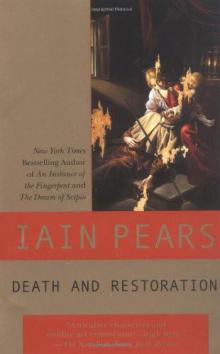 Death & Restoration ja-6
Death & Restoration ja-6 The Immaculate Deception ja-7
The Immaculate Deception ja-7